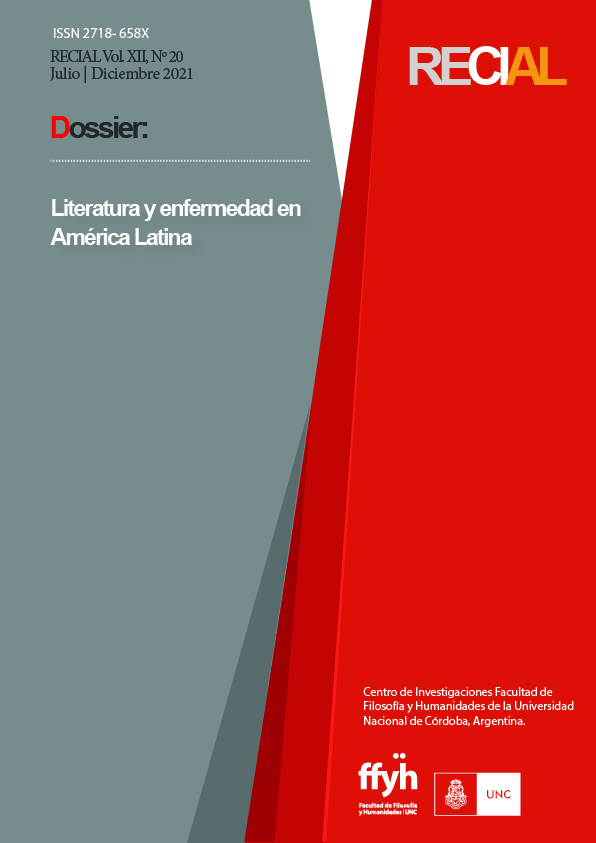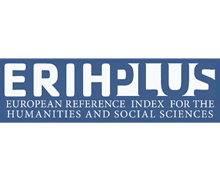The sick body as potency in Fruta podrida (2007) by Lina Meruane
Keywords:
body, disease, decomposition, writing, potencyAbstract
In the present article we propose to carry out a reading of the novel Fruta podrida (2007) by Lina Meruane that will focus on the character of Zoila in order to establish an inquiry about the power of the sick body as a way-of-life within a system that, under the imperative and promise of health, manifests itself in an intervention that separates body and person, and establishes an empire in which the obligation to make-live invades all areas of existence. A series of tensions converge in the character of Zoila that complicate the taxonomies on which the text is built (health/disease, productivity/unproductivity): she lives in the disease that is killing her; she multiplies and re-produces herself; in her apparent leisure, she works towards a goal; and, finally, she captures, through writing, the decomposition of her body. We do not mean by this that the disease represents some kind of liberation for Zoila, but we can affirm that it installs her in another field of power relations from which she, through a series of operations, manages to reposition herself.
Downloads
References
Abate, J y Erlij, E. (2021). Lina Meruane: ‘Nadie está pensando en cómo salvar el mundo: ya se dio por perdido’. Archivo Radial Cultura. Palabra pública, s/p.
Agamben, G. (2006). Homo sacer. El poder soberano y la nuda vida. Valencia: Pre-textos.
Agamben, G. (2007). La inmanencia absoluta. En G. Giorgi y F. Rodríguez (Comps.), Ensayos sobre biopolítica, pp 59-92. Buenos Aires: Paidós.
Deleuze, G. (1996). La literatura y la vida. En Crítica y clínica. Barcelona: Anagrama.
Espósito, R. (2013). Inmunidad, comunidad, biopolítica. E-misférica 10(1), s/p.
Foucault, M. (1999). La escritura de sí. En M. Morey, J. Varela, F. Alvárez Uría y A. Gabilondo (Eds.), Obras esenciales. Barcelona: Paidós.
Francica, C. (2019). Devenires de la corporalidad femenina en Fruta podrida (2007) de Lina Meruane: Toxicidad, memoria y exterminio. Estudios filológicos. Revista de lingüística y literatura, 62, 59-77.
Giorgi, G. y Rodríguez, F. (2007). Prólogo. En G. Giorgi y F. Rodríguez (Comps.), Ensayos sobre biopolítica, pp. 9-34. Buenos Aires: Paidós.
Meruane, L. (2015). Fruta podrida. Buenos Aires: Eterna Cadencia Editora.
Negri, A. (2007). El monstruo político. Vida desnuda y potencia. En G. Giorgi y F. Rodríguez (Comps.), Ensayos sobre biopolítica, pp. 99-139. Buenos Aires: Paidós.
Quintana, I. (2017). Parcelas de vida: el arte y sus restos. 452°F, 17, 122-138.
Sánchez Idiart, C. (2017). Error de cálculo. Vida y enfermedad en la literatura latinoamericana. Kamchatka. Revista de análisis cultural, 10, 163-178.
Tello, A. (2018). Anarchivismo. Tecnologías políticas del archivo. Adrogué, Buenos Aires: Ediciones La Cebra.
Downloads
Published
Issue
Section
License

This work is licensed under a Creative Commons Attribution-NonCommercial-ShareAlike 4.0 International License.
Aquellos/as autores/as que tengan publicaciones en esta revista, aceptan los términos siguientes:
- Los/as autores/as conservarán sus derechos de autor y garantizarán a la revista el derecho de primera publicación de su obra, el cuál estará simultáneamente sujeto a la Licencia de reconocimiento de Creative Commons que permite a terceros compartir la obra siempre que se indique su autor y su primera publicación esta revista.
- Los/as autores/as podrán adoptar otros acuerdos de licencia no exclusiva de distribución de la versión de la obra publicada (p. ej.: depositarla en un archivo telemático institucional o publicarla en un volumen monográfico) siempre que se indique la publicación inicial en esta revista.
- Se permite y recomienda a los/as autores/as difundir su obra a través de Internet (p. ej.: en archivos telemáticos institucionales o en su página web), luego de su publicación en la revista. (Véase El efecto del acceso abierto).

























